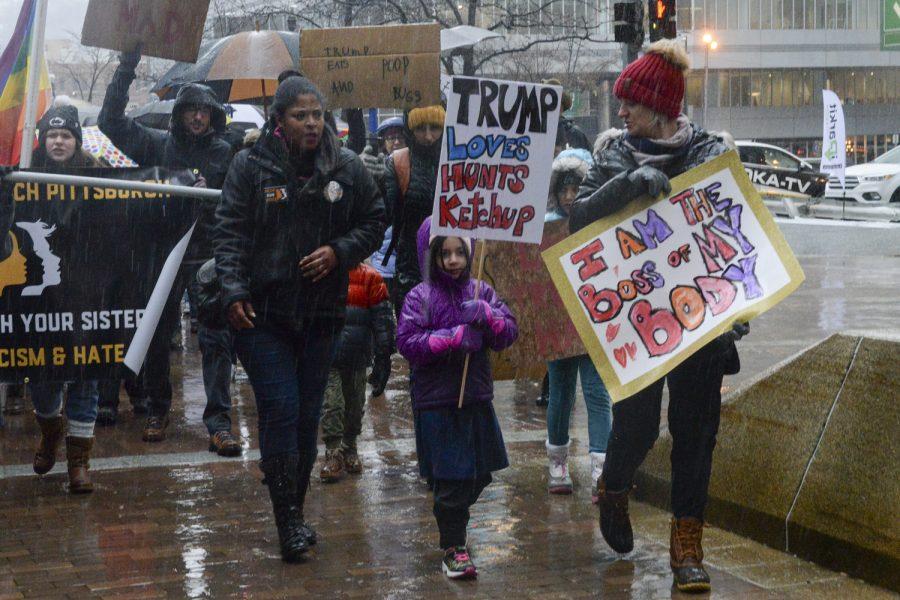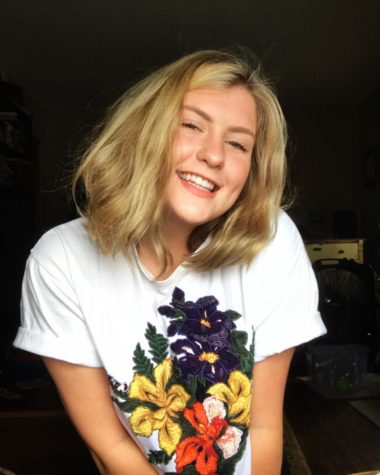March to Market Square: Women’s March Pittsburgh takes on fourth year
Elise Lavallee | Contributing Editor
Demonstrators at the fourth annual Pittsburgh Women’s March walk through the rain on Saturday.
January 21, 2020
Neither rain nor snow stopped the demonstrators in Pittsburgh’s 2020 Women’s March, who concluded their trek by dancing into Market Square to the tune of Whitney Houston’s “I’m Every Woman.”
Hosted by Women’s March D.C. and Indivisible Pittsburgh, the fourth annual Pittsburgh Women’s March was subtitled “Hear our vote! No to war!” Bookended by a series of speeches from local political candidates and activists, Saturday’s march took more than 500 demonstrators on a route beginning at the City-County building at 11 a.m. and concluding at about 3 p.m. in Market Square.
At the opening and closing rallies, attendees heard speeches from Pittsburgh Mayor Bill Peduto, state Reps. Dan Frankel and Jay Costa, U.S. Rep. Mike Doyle and state Sen. Pam Iovino, among others, who spoke on topics such as reproductive rights, voter registration and equal pay for equal work.
Peduto told The Pitt News that he came to the march to let people know that “their city stands with them” as they join a nationwide movement to fight for women’s rights. He cited the upcoming election year as a critical moment for women to affect change.
“Women can decide this vote for who the next president of the United States will be, as well as votes that would bring change locally [and] statewide,” he said. “The entire balance of the supreme court is in jeopardy.”
Peduto also spoke about September’s gender equity report, which demonstrates that gender discrimination is a real and quantitative issue in the City — as well as an area in need of work. With the creation of the Gender Equity Commission, Peduto said the City is taking steps to assure that women have equal access and opportunity within their community.
Tracy Baton, founding organizer of Women’s March Pittsburgh and Pitt alumna, said she agrees with Peduto that Pittsburgh should be do more for black women living in the area.
“Pittsburgh has turned out to be one of the worst places for black women to live in the United States, and we want to lift that up,” Baton said. “We want Pittsburgh to be a place that is hospitable to black women.”
Baton, who grew up in the historic Hill District, has witnessed the mass exodus of black women living in the City. She recalls it being a vibrant and active place that is now mostly empty, as more individuals have moved to the suburbs due to a lack of affordable housing, among other issues.
Baton feels that the march has shifted in purpose over the last four years. In addition to centering black women, march organizers have also focused on connecting people across communities and helping those involved to better understand the mechanics of voting and take activism to the polls.
“We’ve been focusing on reaching out. We have a board member from Duquesne and a board member from Arnold, because we want to be more county-wide and more inclusive because those black women whose lives we are trying to transform, they don’t live in the City anymore.”
At the march, organizers handed out business cards containing QR codes linking to voter registration websites. Keeping with the theme of connection, cards were handed out in multiples so individuals who received them could pass them onto others.
The demonstrators represented a wide variety of ages and backgrounds, including Jan Boyd, 70, of Aspinwall, who said she has been attending marches in support of women’s rights since she was a teenager.
“I’m an old hippie from the ’60s, and I’ve been fighting for these things forever,” she said. “I’m now 70, and I’m still fighting.”
Boyd said she’s been an “aggressive Democrat” since she started voting and that the presence of organizers and strong leaders tends to vary over the years. In recent years, Boyd said she’s noticed the presence of more young people attending rallies and demonstrations.
A large number of students joined the march, including Faith Muse, a sophomore at the Community College of Allegheny County. This was Muse’s fourth time participating in a march, a pattern which began as recently as 2017, when she attended the first Women’s March with her grandmother in Washington, D.C.
Due to weather conditions Saturday and her grandmother being sick, Muse said she considered not going to the march this year. However, she said that she decided to go in the end because the march was something she believed in.
“I may be cold, but that didn’t stop me,” Muse said.
Muse said the theme this year resonated with her own anti-war sentiments, despite having family members who have served.
“It boggles my mind that we could send 17-, 18-year-olds, fresh-out-of-high school kids to fight a war that we did not start.” Muse said. “I really hope they consider the fact that we are not the world’s police force.”
Pitt first-years Sierra Hellman and Molly Scheffler heard of the march through political organization NextGen, which organized a poster-making party for those who planned to attend. Though the rain smeared their signs, Hellman and Scheffler both said it was important to demonstrate with their fellow activists — especially in an election year.
“It doesn’t matter what the weather is, you just have to stand for what you believe in,” Scheffler said. “You just have to vocalize what you believe in, and they’ll hear us. You just have to stand for it.”
Of the various issues discussed at the march, Scheffler, a global management major, said she hoped to see improved policy surrounding abortion law and LGBTQ+ rights. Hellman, an undecided student in the business school, agreed with Scheffler and said she also supported an increase in free sanitary products for women. She added that voting is a key step in advancing policy toward these goals.
“A lot of people nowadays are just like, ‘We don’t need to vote … we don’t really have an effect,’” Hellman said. “But I think we really do.”




